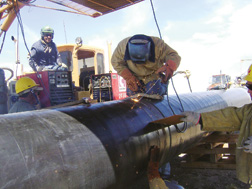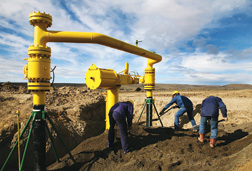...companies and said, ‘Look, we have the ability to do most of the work this would require. How much gas do you want?’”
Cammesa agreed to 8 million cu m and Albanesi to 5 million cu m. With that commitment, Brazil’s National Bank for Economic and Social Development (BNDES) agreed to help, financing $882 million of Odebrecht’s contract.
The economic demands that have made the project a priority are further complicated by the formidable technical aspects of the job. For instance, the geography and weather for large portions of the line across Argentina's vast Patagonia region created a limited work window to complete the job. The far southern reaches of Argentina are blasted mercilessly by the cold winds of Antarctica. During the winter, between May and September, work is almost impossible throughout southern Patagonia. Antarctic fronts whip across the region, dropping temperatures as low as -100°C.
Key to the project’s success was to complete as much of the southernmost portion as early as possible in order to have work in more temperate regions available in latter stages of the contract.
For much of the work, communications have been the primary obstacle. Many sections in the southern portion of the line are located in areas with either limited-access or non-existent telecommunications. Subcontractors rely on radios and cell phones to coordinate with Odebrecht.
 C.J. Schexnayder Pipeline takes shape as crews weld steel-pipe sections in far-flung work sites.
|
“When problems emerge there is often no one available to solve them,” says planning leader Martin Masini.
A key means of keeping logistics under control has been getting a head start whenever possible. Compression units, for example, were purchased at the very beginning of the contract due to the lead time needed to procure.
Caterpillar subsidiary Solar built 12 compression units that are already in Argentina. The final three are currently under construction in Germany by MAN Turbo. Gas will be piped into the compression plants at approximately 400 psi and returned to the pipeline at 700 psi. Each plant requires between six to nine months to construct.
Flavio Faria, Odebrecht’s project director for the pipeline work, says the solution to logistical problems is by maximizing work fronts and eliminating downtime. “We have had as many as 14 simultaneous fronts going at a time,” he says. “In May of this year we had more than 4,500 people working on the effort.”
Another problem has been water. Much of the remote interior of Patagonia is dry and water is tough to access. Every meter of line requires 450 liters of water for testing.
“When you are dealing with a section 50 kilometers long, that’s a lot of water to have in a place where there is no water to be found,” Masini says. The contractor generally transports water by truck, more than 100 kilometers away in some areas.
A surge in materials prices also created hurdles. Although prices have increased more than 70% since 2006, the contract includes provisions for changes in materials costs. Still, there is a bureaucratic cost because of the country’s approval process for cost adjustments.
“In Argentina, no adjustment is automatic,” Facadio says. “You negotiate each and every one.”
 C.J. Schexnayder Doubling Argentina’s natural-gas supplies will bolster power reliability and increase capacity in the capital city, actions designed to boost the nation’s economy.
|
Complicating things even further was a major corruption scandal last year that involved work on a pipeline segment being handled by Sweden’s Skanska. An internal review by the firm revealed as much as $4 million was paid to the company for work never performed. Prosecutors believe as much as $17 million was used as bribes to government officials.
Skanska fired its Latin American CEO along with several other executives in its Argentinean branch and several government officials, including the director of the state-run gas regulatory agency, were dismissed. Odebrecht was not involved and has not had any accusation of impropriety in its portion of the work.
When the pipeline is complete in 2010, the new capacity should put Argentina’s natural-gas supplies at a level that can meet the country’s demand for at least four years. That will help avert a short-term financial crisis due to escalating energy costs and buy the country time to search for other alternatives.
“The only way to sort out the energy problem in Argentina is to either find new gas reserves, which many believe are here, or increase hydroelectric generation.” Facadio says. “When these larger infrastructure projects move forward we are ready to move forward on them.”

Post a comment to this article
Report Abusive Comment